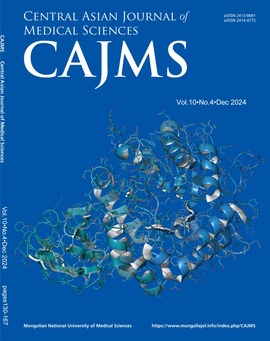Surgical Treatment of Velopharyngeal Insufficiency Following Primary Palatoplasty
DOI:
https://doi.org/10.24079/cajms.2024.04.003Keywords:
Cleft palate, Nasopharyngoscopy, Primary palatoplasty, Surgical technique, Velopharyngeal insufficiencyAbstract
Objective: Identify a better surgical method for primary palatoplasty in a specific cleft type and evaluate outcomes of velopharyngeal insufficiency correction surgery. Methods: A prepost study design was conducted by collecting data from cleft patients’ medical charts used at the National Center for Maternal and Child Health in Mongolia. The Veau classification was used for the type of palatal clefts. Results: 335 cleft palate patients were included in this study. Of the participants, 133 patients were diagnosed with VPI after primary palatoplasty. Of 75.9%, they underwent secondary palatoplasty with a soft palate Z plasty method and 24.1% by a pharyngeal flap technique. The result of the NPS examination postoperatively is as follows: the adequate velopharyngeal function was 97% for the soft palate Z plasty method and 84.4% for the pharyngeal flap technique. (P= 0.021). Conclusion: The Furlow and Mongolian techniques are superior for maintaining velopharyngeal function after primary palatoplasty. For correcting velopharyngeal insufficiency, the secondary soft palate Z plasty and a superior-based pharyngeal flap demonstrate good speech results after surgery.
Downloads
280
References
1. Calzolari E, Pierini A, Astolfi G, et al. Associated anomalies in multi-malformed infants with cleft lip and palate: An epidemiologic study of nearly 6 million births in 23 EUROCAT registries. Am J Med Genet A. 2007;143:528-537. https://doi.org/10.1002/ajmg.a.31447
2. Bulgan B, Chudurbat G, Erdenetsogt J, et al. The prevalence and type of congenital cleft of the lip and palate in Mongolia, affiliation of the patients. Mongol J Obst Gyn Pediat. 2022;32:2334-2339.
3. Orkhontuul P, Gantuya T, Khishigjargal B, et al. Epidemiological study of maternal and child morbidity and mortality and congenital malformations in Mongolia-X. Report of study, National Center for Maternal and Child Health, Ulaanbaatar, Mongolia. 2024;p97-111
4. Haapanen ML. Factors affecting speech in patients with isolated cleft palate. A methodic, clinical, and instrumental study. Scand J Plast Reconstr Surg Hand Surg Suppl. 1992;26:1-61.
5. Gart MS, Cosain AK. Surgical management of velopharyngeal insufficiency. Clin Plast Surg. 2014;41:253-270. https://doi.org/10.1016/j.cps.2013.12.010
6. Hsu PJ, Wang SH, Yun C, et al. Redo double opposing Z plasty is effective for correcting marginal velopharyngeal insufficiency. J Plast Reconstr Aesth Surg. 2015;68:1215-1220. https://doi.org/10.1016/j.bjps.2015.05.014
7. Hosseinabad HH, Derakhshandeh F, Mostaajeran F, et al. Incidence of velopharyngeal insufficiency and oronasal fistulae after cleft palate repair: a retrospective study of children referred to Isfahan Cleft Care Team between 2005 and 2009. Int J Pediatr Otorhinolaryngol. 2015;79:1722-1726. http://dx.doi.org/10.1016/j.ijporl.2015.07.035
8. David DJ, Anderson PJ, Schnitt DE, et al. From birth to maturity: a group of patient who have completed their protocol management. Part II. Isolated cleft palate. Plast Reconstr Surg. 2006;117:515-526 https://doi.org/10.1097/prs.0b013e31821e6f92
9. Chim H, Eshraghi Y, Iamphongsai S, et al. Double-Opposing Z-Palatoplasty for Secondary Surgical Management of Velopharyngeal Incompetence in the Absence of a Primary Furlow Palatoplasty. Cleft Palate Craniofac J. 2015;52(5):517-524. https://doi.org/10.1597/13-187
10. Naran S, Ford M, Losee JE. What's New in Cleft Palate and Velopharyngeal Dysfunction Management? Plast Reconstruct Surg.2017;139(6):1343e-1355e. https://doi.org/10.1097/prs.0000000000003335
11. Gustafsson C, Heliovaara A, Leikova J, et al. Incidence of speech correcting surgery in children with isolated cleft palate. Cleft Palate Craniofac J. 2018;55(8):1115-1121. https://doi.org/10.1177/1055665618760889
12. Gamble C, Persson C, Willadsen E, et al. Timing of primary surgery for cleft palate. N Engl J Med. 2023; 389: 795-807. https://doi.org/10.1056/nejmoa2215162
13. Becker DB, Grames LM, Pilgram T, et al. The effect of timing of surgery for velopharyngeal dysfunction on speech. J Craniofac Surg. 2004;15:804-809. https://doi.org/10.1097/00001665-200409000-00020
14. Murat S, Baljinnyam B, Khishigdari Y, et al. Visual Outcomes Following Traumatic Cataract Surgery in Children in Mongolia: Experience Over 2 Years at a Major Hospital. Cent Asian J Med Sci. 2021;7:213-221. https://doi.org/10.24079/cajms.2021.09.006
15. Golding-Kushner KJ, Argamaso RV, Cotton RT, et al. Standardization for reporting nasopharyngoscopy and multiview videofluoroscopy: an international working group report. Cleft t Palate J. 1990;27:337-347. https://doi.org/10.1597/1545-1569(1990)027%3C0337:sftron%3E2.3.co;2
16. Ayanga GN, Davaanyam L, Purevjav N, et al. Comparative study of surgical technique for correcting the congenital cleft palate in Mongolia. J Korean Assoc Oral Maxillofac Surg. 2009;31:381-385.
17. Costello BJ, Ruiz L. Oral and Maxillofacial Surgery. In: Fonseca RJ, Timothy AT, Marciani RD, editors. Cleft Palate Repair - Concepts and controversies. 2nd ed. New York USA: Elsevier Health Sciences;2008:p759–772.
18. Sommerlad BC. Cleft palate repair. In Losee JE, Kirschner RE eds. Comprehensive Cleft Care. USA: McGraw Hill Company;2009:p399-411.
19. Randall P, Jackson O. A short history of cleft lip and palate. In Losee JE, Kirschner RE eds. Comprehensive Cleft Care. USA: McGraw Hill Company;2009:p187-209.
20. Schweckendiek W, Doz P. Primary pyeloplasty: Long-term results without maxillary deformity- a twenty-five-year report. Cleft Palate J. 1978;15(3):268-274.
21. Randall P, LaRossa D, Solomon M, et al. Experience with the Furlow double-reserving Z-plasty for cleft palate repair. Plast Reconstr Surg. 1986;77(4):569-576.
22. Ayanga GN, Davaanyam L, Purevjav N, et al. Cleft palate repair in Mongolia: Modified palatoplasty vs conventional technique. Ann Maxillofac Surg. 2012;2(2):131-135. https://doi.org/10.4103/2231-0746.101337
23. Dong Y, Dong F, Zhang X, et al. An effect comparison between Furlow double opposing Z-plasty and two-flap palatoplasty on velopharyngeal closure. Int J Oral Maxillofac Surg. 2012;41:604-611. https://doi.org/10.1016/j.ijom.2012.01.010
24. Yu CC, Chen PK, Chen YR. Comparison of speech results after Furlow palatoplasty and von Langenbeck palatoplasty in incomplete of the secondary palate. Chang Gung Med J. 2001;24:628-632.
25. Pearson GD, Kirschner RE. Surgery for cleft palate and velopharyngeal dysfunction. Semin Speech Lang. 2011;32:179-190. https://doi.org/10.1055/s-0031-1277720
26. Collins J, Cheung K, Farrokhyar F, et al. Pharyngeal flap versus sphincter pharyngoplasty for the treatment of velopharyngeal insufficiency: meta-analysis. J Plast Reconstr Aesthet Surg. 2012;65:864-868. https://doi.org/10.1016/j.bjps.2012.01.020
27. Liao YF, Chuang ML, Chen PK, et al. Incidence and severity of obstructive sleep apnea following pharyngeal flap surgery in patients with cleft palate. Cleft Palate Craniofac J. 2002;39:312-316. https://doi.org/10.1597/1545-1569_2002_039_0312_iasoos_2.0.co_2
28. Wienfeld AB, Hollier LH, Spira M, et al. International trends in the treatment of cleft lip and palate. Clin Plast Surg. 2005;32:19-23. https://doi.org/10.1016/j.cps.2004.08.002
Downloads
Published
How to Cite
Issue
Section
License
Copyright (c) 2024 Mongolian National University of Medical Sciences

This work is licensed under a Creative Commons Attribution-NonCommercial 4.0 International License.




